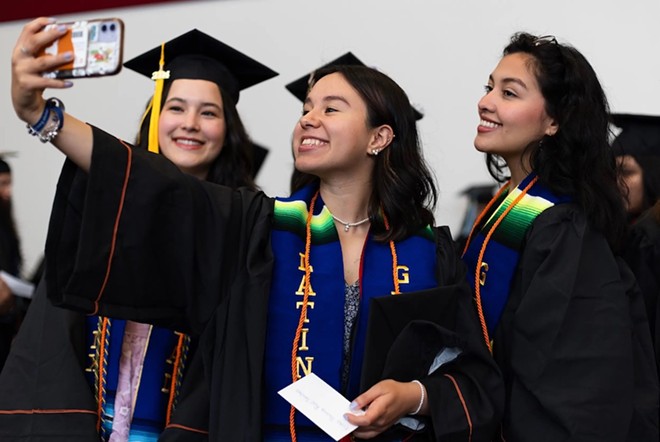
Texas Tribune / Maria Crane
Graduates take a selfie previous to the College of Texas at Austin Latinx Commencement on Could 9, 2024 in Austin. The graduates obtained orange chords, a nod to the colour of monarch butterflies that symbolize the resilience of Latinx immigrants. Credit score: Maria Crane/The Texas Tribune
Join The Temporary, The Texas Tribune’s day by day publication that retains readers on top of things on essentially the most important Texas information.
Liany Serrano Oviedo crouched in her yellow commencement costume, stared on the mirror and thoroughly blotted her tears with a wipe. It was a uncommon second for the 22-year-old College of Texas at Austin senior to be alone and collect her composure.
Serrano Oviedo had been in high-performance mode all Thursday morning, making laps to get the whole lot prepared for the Latinx commencement ceremony she deliberate, typically breaking out right into a jog to get from one facet of the venue to a different.
However she had a second of frailty whereas speaking with a donor who helped sponsor the occasion. All of her onerous work within the final 4 years — getting her diploma and organizing Thursday’s ceremony — was for her Venezuelan mother and father, she mentioned.
“This commencement is an enormous deal as a result of an enormous chunk of it’s bilingual,” Serrano Orviedo mentioned. “And my mother’s English is not that nice. And so this ceremony is one the place I do know 100% she’s understanding the whole lot that is being mentioned.”
For many years, subsets of Texas faculty graduates — from Latinx to LGBTQ college students — have organized intimate occasions separate from the bigger graduation ceremony to have fun the completion of their levels within the context of their identities and cultural heritage.
However that is the primary yr UT-Austin and different Texas public universities lower funding and workers assist for such ceremonies in response to Senate Invoice 17, a brand new state legislation that bans range, fairness and inclusion packages.
College students throughout the state like Serrano Oviedo fought tooth and nail to rescue cultural graduations, usually taking up the burden of planning and discovering funding for the ceremonies. The Latinx commencement ceremony came about days earlier than UT-Austin’s graduation, which might be held Saturday.
“It would not matter what number of obstacles you are going to throw at our neighborhood,” mentioned Serrano Oviedo. “We’re nonetheless going to thrive and we will discover different methods.”
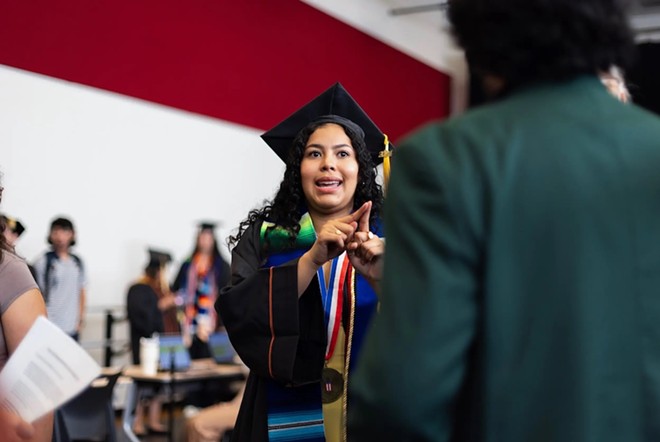
Texas Tribune / Maria Crane
Liany Serrano Oviedo assigns roles to organizers previous to the ceremony as she was serving to information and set up the graduates on the ceremony. “This actually, actually is an enormous deal as a result of they’re becoming a member of a cohort of Latinos who just about confronted all odds to have the ability to get into greater schooling and keep there,” she mentioned.
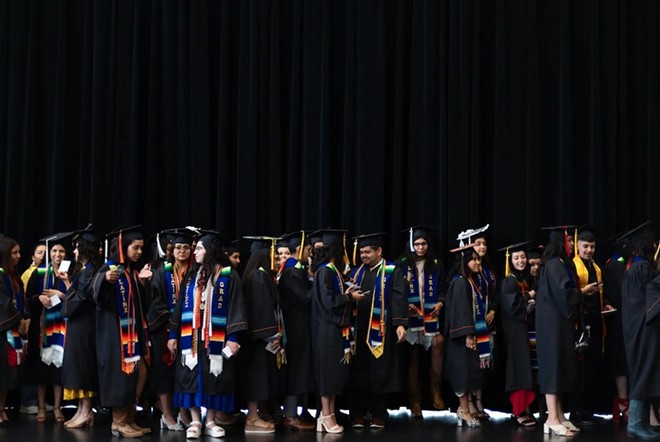
Texas Tribune / Maria Crane
Subsets of Texas faculty graduates — from Latinx to LGBTQ college students — have organized intimate occasions separate from the bigger graduation ceremony to have fun the completion of their levels within the context of their identities and cultural heritage.
College students take the lead
For years at UT-Austin, hundreds of Latino members of the family would pack the on-campus Gregory Gymnasium on the finish of the varsity yr to see their graduates stroll the stage. Some graduates used to put on serape soles fabricated from conventional Mexican material. It was the one ceremony the place this system was learn in English and Spanish.
The now-defunct Multicultural Engagement Heart would additionally pay for surprises for the households, like reside Latin bands and meals and floral decorations that matched the serapes.
However to adjust to SB 17, public universities in Texas have shuttered the multicultural facilities that used to prepare cultural commencement ceremonies just like the Latinx celebration.
Lawmakers who supported the passage of SB 17 final yr argued that DEI packages and coaching had been indoctrinating college students with left-wing ideology and compelled universities to make hires based mostly on their assist of range efforts quite than on advantage and achievement.
The ban didn’t cease college students within the graduating class of 2024 from organizing their very own occasion. Serrano Oviedo and different seniors raised $9,000 with assist from Latino leaders throughout the state. Austin Metropolis Council Member José “Chito” Vela secured a neighborhood performing arts middle for the scholars to host the ceremony off campus. The League of United Latin American Residents, the oldest Latino civil rights group within the U.S., stepped in to pay for that venue.
College students graduating this yr have already been formed by a singular set of world and political forces. A lot of them graduated highschool and entered faculty within the thick of the pandemic, which suggests they missed out on a proper ceremony again then. And now they’re leaving at a time the place pro-Palestinian protests have damaged out throughout campus, together with UT, resulting in dozens of scholar arrests.
On Thursday, as UT-Austin historical past professor Emilio Zamora adjusted the satin hood for one scholar on the Latinx ceremony, he referred to as the survival of the custom “a declaration of independence” from public establishments.
“These college students are demonstrating they may have the ultimate say,” he mentioned. “It’s a demonstration of our resilience. The college has failed us, however we’ve got risen to the event with our youth.”
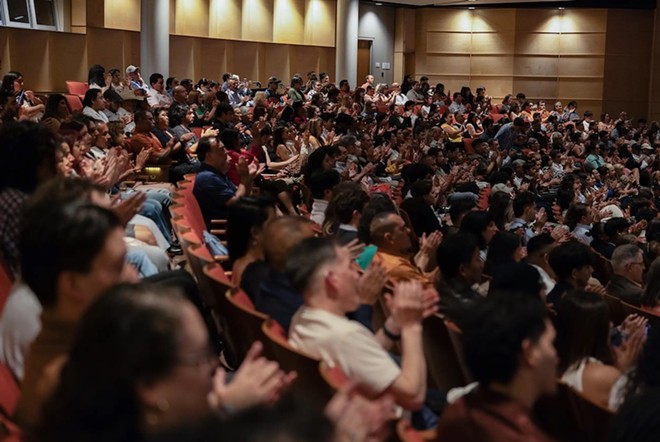
Texas Tribune / Maria Crane
Household and associates of graduates cheer through the ceremony. To adjust to SB 17, public universities in Texas have shuttered beloved multicultural facilities that used to prepare cultural commencement ceremonies just like the Latinx celebration.
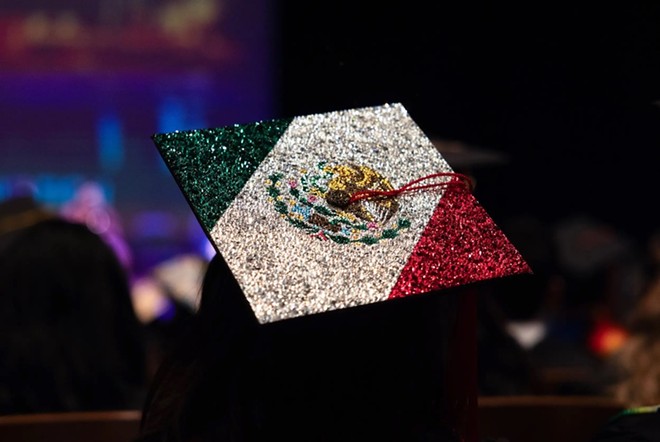
Texas Tribune / Maria Crane
A embellished cap of the Mexico flag performed in rhinestones sits on high of a graduate’s head through the ceremony. For some college students and college, celebrating the accomplishments of Latinx college students is a crucial recognition of the onerous highway that they journeyed on to get their diploma. Credit score:
A nod to household
Underneath the pink and purple lighting of the nearly-full auditorium, mother and father, grandparents, aunts and uncles clapped, cheered and clapped once more.
Cultural ceremonies usually elevate themes which can be essential to these teams of scholars — like household to the Latinx neighborhood — and aren’t all the time a part of university-wide graduations.
“Gracias a mi mami y papi”— “Thanks to my mom and father” in Spanish — one college students’ commencement cap learn. One other one learn, “Sus sacrificios y apoyo son la razón por la cual lo logre”: “Your sacrifices and assist are the explanation I made it.”
For some college students and college, celebrating the accomplishments of Latinx college students is a crucial recognition of the onerous highway they journeyed on to get their diploma. Latino faculty college students are sometimes the primary of their household to get a school diploma. That makes cultural ceremonies, which acknowledge the generational sacrifices and obstacles that households have overcome, all of the extra vital.
They’re additionally an essential gesture if Texas universities wish to proceed to recruit, retain and graduate Latino college students, supporters say.
Regardless of being designated a Hispanic-serving establishment, UT-Austin’s enrollment nonetheless lags behind in representing the state’s make-up. Hispanic residents characterize the most important share of Texas’ inhabitants — 40% — however solely about 25% of scholars at UT-Austin are Hispanic.
“The cornerstone of a profitable Texas is to be doing all of [these cultural events]. In essence, it’s going to have an effect on lecturers and the way individuals of colour understand the state,” mentioned Katherine Ospina, a UT senior who raised the funds to pay for the ceremony. “Texas is a particularly various state and we have to capitalize on that range.”
Domingo Garcia, the president of LULAC, the Latino civil rights group that lined the price of the venue, mentioned he labored two jobs to be the primary in his household to graduate from faculty. Preserving cultural graduations within the face of the DEI ban sends a sign that Latino tradition has a spot within the state, Garcia mentioned.
“Folks do not perceive the sacrifices that folks, a lot of them working class, have made to have that son or daughter attend UT and what they’ve gone by means of to get to that place,” mentioned Garcia, who’s a former state consultant. “To not be allowed to have fun your tradition, to have fun who you are from and what your loved ones’s from, it is actually immoral.”
Ospina mentioned she couldn’t let the category of 2024 be “misplaced within the ether” of a post-SB 17 actuality.
On Thursday, as the previous few members of the family filtered out of the venue with their graduates on the finish of the ceremony, Serrano Oviedo balanced a stack of leftover orange cords and a plastic H-E-B bag.
Serrano Oviedo mentioned she is attempting to safe funding from town of Austin for future ceremonies. A brand new spherical of scholars should step in to do the work of organizing, however she’s hopeful the custom will proceed.
“The whole lot the state Legislature and college threw our means, we overcame,” Serrano Oviedo mentioned.
Ikram Mohamed contributed to this report.
The Texas Tribune companions with Open Campus on greater schooling protection.
Disclosure: H-E-B and College of Texas at Austin have been monetary supporters of The Texas Tribune, a nonprofit, nonpartisan information group that’s funded partially by donations from members, foundations and company sponsors. Monetary supporters play no function within the Tribune’s journalism. Discover a full checklist of them right here.
This text initially appeared within the Texas Tribune.
The Texas Tribune is a member-supported, nonpartisan newsroom informing and interesting Texans on state politics and coverage. Study extra at texastribune.org.
Subscribe to SA Present newsletters.
Observe us: Apple Information | Google Information | NewsBreak | Reddit | Instagram | Fb | Twitter| Or join our RSS Feed





